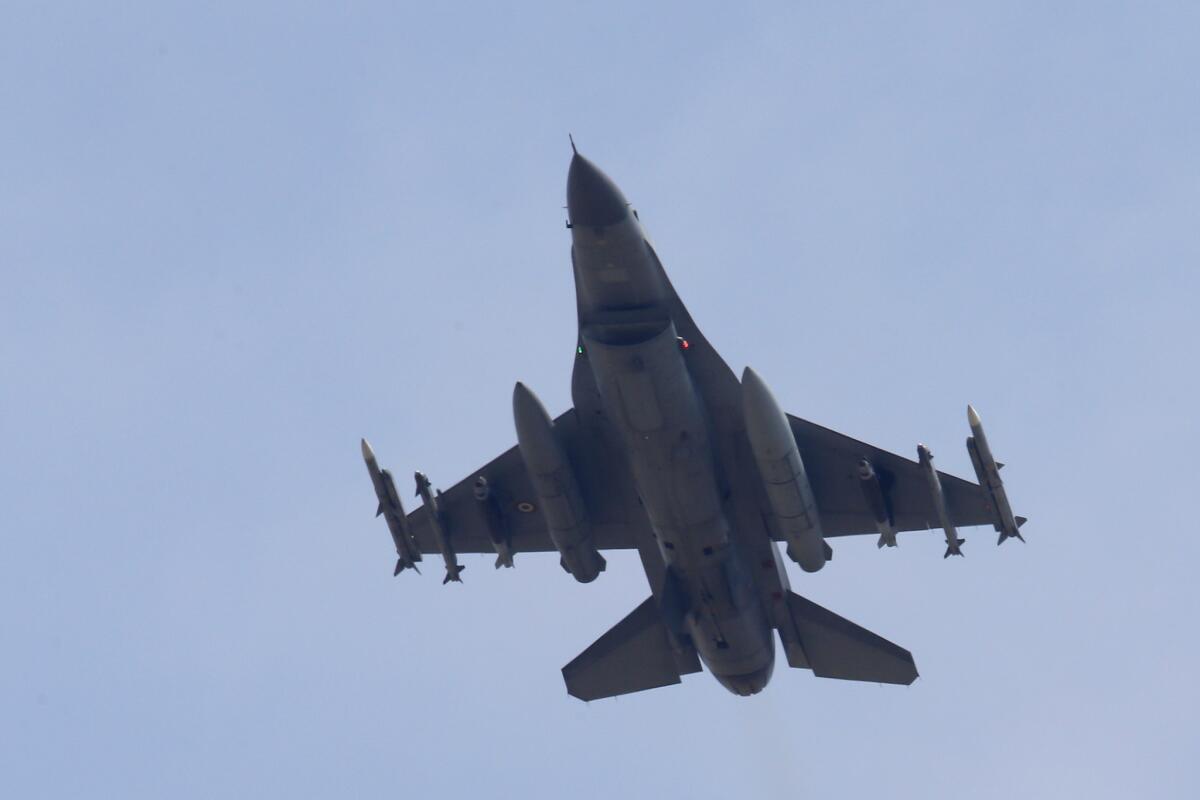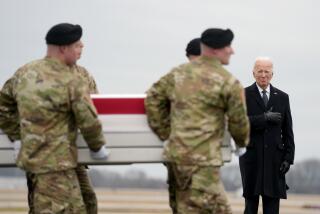Turkey steps up bombing -- but on Kurds, not Islamic State

A missile-loaded Turkish Air Force warplane rises in the sky after taking off from Incirlik Air Base, in Adana, Turkey, on Wednesday.
Turkish war planes on Wednesday unleashed some of the heaviest bombing to date on Kurdish rebel strongholds in Turkey and Iraq, as the fallout from Ankara’s stepped-up anti-terror campaign reverberated in the nation’s political arena.
The latest strikes hit at least half a dozen targets linked to the Kurdistan Workers Party, or PKK, according to Turkish media accounts citing official statements.
Last week, Ankara announced with great fanfare that it was joining the U.S.-led international coalition against the Islamic State, the Al Qaeda breakaway group that has seized large swaths of Syria and Iraq, two of Turkey’s neighbors. Previously, Turkey had been hesitant to join the coalition, despite the nation’s front-line status in the conflict.
But Turkey has focused its firepower since then not on the Islamic extremists but on its longtime adversary — the secular PKK, whose allied forces have been at the vanguard of the fight against the Islamic State.
Turkish officials blame PKK “terrorists” for breaking an informal cease-fire with recent attacks on Turkish police officers and other targets.
But Turkish activists and opposition politicians have accused the government of using its announced crackdown on the Islamic State as a pretext to bomb PKK targets and round up Kurdish activists, threatening a two-year peace process.
‘Safe zone’ in Syria
Turkey’s push for a “safe zone” in northern Syria in cooperation with the United States is designed to thwart Kurdish militia fighters from extending their control of the Syrian side of Turkey’s southern border, Selahattin Demirtas, leader of the Kurdish-oriented People’s Democratic Party, told the BBC.
“Turkey doesn’t intend to target IS with this safe zone,” Demirtas told the British broadcaster, using an acronym for Islamic State. “The safe zone is intended to stop the Kurds, not IS.”
See the most-read stories this hour >>
Turkish leaders deny that the current offensive is meant to curb Kurdish territorial and political gains. Turkish Prime Minister Ahmet Davutoglu has called the campaign a “synchronized fight against terror,” whether the targets are the PKK, Islamic State or other groups.
The heavy bombing runs against Kurdish targets are playing out at a delicate moment in Turkey’s complex political landscape.
The opposition Kurdish-oriented party, known as the HDP, emerged as a major electoral power last month with a surprisingly strong showing in parliamentary balloting. The HDP reached beyond its Kurdish base to attract many leftists, liberals and others disenchanted with the government of President Recep Tayyip Erdogan and his long-dominant Justice and Development Party, which has its roots in Sunni Islamist politics.
The Kurdish party’s stunning rise helped block Erdogan’s extensive plans to win a super-majority in the Parliament. Erdogan had sought to push through constitutional changes that would have greatly enhanced his presidential powers, but his party failed to win even a legislative majority.
Erdogan’s critics
Critics have accused a furious Erdogan of trying to whip up nationalist sentiment against the Kurds in a bid to bolster his standing in prospective new parliamentary elections that could be scheduled in coming months.
“It is obvious that Erdogan is using the horrifying terror image of ISIS to justify his attacks on the PKK,” said Hazal Arda, a leftist activist, using another acronym for Islamic State. “The air strikes are [a] show which creates an artificial war.”
The leader of the main opposition Republican People’s Party, Kemal Kilicdaroglu has assailed what he calls a dangerous and divisive trend.
”The man sitting in the illegal palace is gambling with Turkey’s future,” Kilicdaroglu said, referring to the country’s lavish new presidential palace, which critics have condemned as excessive and unlawfully constructed — allegations dismissed by Erdogan.
The pugnacious Erdogan has been predictably unrepentant, saying the government air strikes are an appropriate response to what he calls PKK terrorism. He has threatened to cut off peace talks.
“It is not possible for us to continue the peace process with those who threaten our national unity and brotherhood,” Erdogan told reporters on Tuesday before leaving on a state trip to China.
The president also has called for legal action against Kurdish lawmakers, seeking criminal cases against parliamentarians with reported ties to the PKK. Opposition representatives must “pay the price” for links to “terrorist groups,” Erdogan declared.
Kurdish lawmakers call the allegations spurious and have called on all parliamentarians to relinquish their legal immunity — a step that could also subject ruling-party lawmakers to corruption prosecutions.
Peace process in peril
While the peace initiative between Ankara and the Kurds has not been formally terminated, the process appears to be hanging by a thread.
Negotiations between the government and the Kurds began in 2013 after imprisoned PKK founder Abdullah Ocalan, who is serving a life sentence for terrorism-related charges, called on militants to lay down their arms following almost 30 years of war with the Turkish state. Even critics credited Erdogan for taking a bold step to seek reconciliation with Turkey’s long-repressed Kurdish minority. But now, many accuse Erdogan of pandering to Turkish nationalist voters outraged at any compromise with the Kurds.
As part of its accelerated anti-terror campaign announced last week, Turkey also granted Washington and its allies long-sought access to Turkish bases. However, Turkey says that that the permission does not extend to U.S. operations backing Syrian Kurdish militias fighting Islamic State.
NEWSLETTER: Get the day’s top headlines from Times Editor Davan Maharaj >>
U.S. warplanes have made hundreds of forays in support of Syrian Kurdish fighters, who have proved to be among the most effective ground forces against Islamic State. With the help of U.S. air strikes, the Kurds have routed Islamic State fighters from Syrian border towns like Kobani and Tal Abyad and have asserted control of much of Syria’s more than 500-mile border with Turkey.
But Turkey regards the Syrian Kurdish militias fighting the Islamic State as proxies for the PKK. Turkish officials have viewed the Kurds’ territorial advances along Turkey’s southern flanks as strategic gains for the PKK, its longtime foe, and have been keen to thwart the Kurdish advance in Syria. Kurdish activists have accused Ankara of aiding Islamic State and other jihadist groups fighting in Syria, an allegation denied by Ankara.
Special correspondent Bailey-Hoover reported from Istanbul and staff writer McDonnell from Beirut.
Follow @mdcneville for news from the Middle East.
ALSO
Jonathan Pollard, American who spied for Israel, to get parole
Turkey and the U.S. join forces in fight for ‘Islamic State-free zone’ in Syria
Libyans shrug as Moammar Kadafi’s son is sentenced to death by firing squad
More to Read
Start your day right
Sign up for Essential California for news, features and recommendations from the L.A. Times and beyond in your inbox six days a week.
You may occasionally receive promotional content from the Los Angeles Times.






